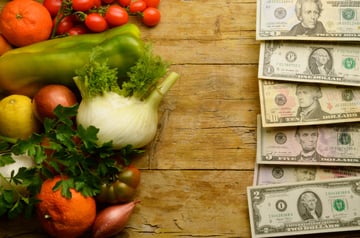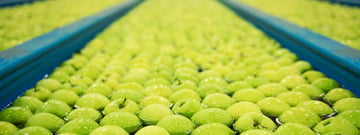“We want to make sure that we’re providing the safest food at the highest quality. The only way to really do that is to keep track of each individual supplier on a regular basis. You have to turn to technology.” — Red Lobster Director of Total Quality and Food Safety Dennis Price.
Red Lobster has been leading the charge in delivering quality, sustainable seafood since 1968. And, with fans like Beyoncé, the brand has proven that excellence is to “Sea Food Differently,” particularly in terms of sourcing and standards. The Red Lobster commitment includes serving seafood “in ways that are traceable, sustainable, and responsible,” which is something that the entire food safety and quality team takes very seriously. Red Lobster Director of Total Quality and Food Safety Dennis Price spoke with FoodLogiQ on how his team leverages FoodLogiQ Connect auditing functionality to elevate standards throughout Red Lobster's global supply chain and ensure that the company is doing its part to protect ocean resources while serving customers across hundreds of locations.
Red Lobster’s Approach to Auditing
Red Lobster’s auditing practices are diverse, falling into a number of categories. Like many foodservice companies, the company relies heavily on third-party audits. These audits are conducted by accredited companies that interview personnel and inspect facilities to ensure that suppliers are compliant with various standards and requirements, particularly those set forth by the Food and Drug Administration. With roughly 350 suppliers, these third-party audits constitute a mammoth undertaking that needs to be completed in order to procure all the ingredients and products reflected on the Red Lobster menu, from large beverage manufacturers with numerous bottling facilities to seasonal crab suppliers operating from a single location.
Price and his team conduct a second order of third-party audits on supplier documentation using FoodLogiQ’s Manage + Monitor solution. This gives the team a bird’s eye view on the status and completion of documentation throughout the supply chain and provides verification that standards are being met.
“We utilize FoodLogiQ, from a compliance standpoint, to evaluate the timeliness of suppliers as they upload their information, as well as upkeep,” says Price. “With a small team, it’s hard to stay on top of 350 suppliers, much less 600+ locations. We look to FoodLogiQ to give us real-time dashboards and reports that tell us if we’re in a risk zone with any of our suppliers, particularly suppliers that produce high-risk or center-of-the-plate food items.”
Price makes designations for high, medium and low-risk products within the FoodLogiQ Connect platform so that his team can review compliance by product risk level. This helps the Red Lobster team dedicate special attention to areas of their supply chain where products are more susceptible to fraud, hazards or food safety incidents. However, all suppliers need to keep pace with the company’s requirements. “It’s unacceptable for suppliers to conduct business without having the right documentation in place,” says Price.
Verifying Your Claims, Values and Brand Promise
Price and his team leverage the same auditing approach to verify the elevated sustainability and sourcing standards that the brand is known for today. The company works with a number of key organizations to ensure that all points of the Red Lobster supply chain are adhering to ethical and sustainable practices. Among these organizations are SGS global, the Monterey Bay Aquarium and the Marine Stewardship Council. The audits conducted by, or in accordance with the standards set forth by, these bodies ensure that Red Lobster is procuring food items from credible sources all the way up the chain. “Whether you're six degrees separated or twelve degrees separated, you’re still tied to that whole supply chain,” says Price.
For the Red Lobster team, there is only one way to build a brand on sustainably sourced seafood, and that is to execute and verify those values, in addition to working with experts. The partnership with Monterey Bay Aquarium keeps the company in lockstep with important information on how to protect various fish populations and ocean resources. “We work with them to ensure we are only sourcing products from suppliers that can provide a sustainable product to us,” says Price. This is, in part, so that future generations can enjoy the same resources and food experiences Red Lobster customers enjoy today.
And, while market trends show that consumers are increasingly motivated to purchase sustainability-marketed products, Red Lobster has become an active participant in helping educate guests on issues of seafood sustainability throughout the dining experience as another facet of their commitment to these values. Through this multi-pronged approach of sourcing, verification, partnerships and education, Price says that they are working to illustrate that “Red Lobster is a company, nationally and globally, that will preserve oceans and seafood now and for generations to come.”
Quality is an equally important factor in maintaining Red Lobster’s values and commitments. Price’s team works with the Marine Stewardship Council to audit the wild-caught seafood species served at Red Lobster from a quality perspective. “We ask all of our suppliers that comply with these standards to provide MSC certifications in their profile within FoodLogiQ. That way we can keep tabs, not only on the process engineering that is happening at the plant, but also to make sure that they are following the bylaws established by the Marine Stewardship Council in conjunction with the seafood industry.” Through auditing these documents within FoodLogiQ Connect, Price says Red Lobster is able to ensure they are “adhering to the highest levels of procuring and processing seafood.”
The Importance of Technology and Internal Auditing
Maintaining compliance, rigorous standards and keeping pace with stringent sustainability requirements necessitates streamlined processes. Price and his team need to be able to account for every requirement across each supplier. This has pushed his team to rely on technology for supplier documentation, auditing and verification. “We want to make sure that we’re providing the safest food at the highest quality,” says Price. “The only way to really do that is to keep track of each individual supplier on a regular basis. You have to turn to technology.” An alternative doesn’t exist, as relying on paper records for auditing stops being feasible or effective for major brands. “Without having technology like FoodLogiQ Connect in the mix, you’re trying to conduct a paperwork exercise that becomes pretty enormous for a company like Red Lobster,” says Price.
FoodLogiQ has recognized the importance of auditing for the development and maintenance of top-tier quality and safety standards and has made recent enhancements to the platform to better support customers like Red Lobster. Price noted the significance of the new internal audits feature, in particular, saying, “Red Lobster relies heavily on FoodLogiQ Connect auditing to ensure the quality and safety of our global supply chain. We’re thrilled FoodLogiQ has expanding auditing capabilities in the form of internal audits. The ability to monitor and verify compliance, sustainability and quality across our organization enables us to be more efficient in delivering seafood of the highest quality to all our customers and locations.”
This development also comes at the perfect time, according to Price, as additional safeguards need to be put in place when auditing with leaner operations, as many have needed to do in light of the COVID-19 pandemic: “Internal auditing is greatly important right now because we’re all still reeling from the loss of manpower in conjunction with more operating hours. It’s forcing the industry to think outside of the box and think about how we can achieve the same results with increased reliance on technology and fewer people. We are able to now have one person that helps us from afar when it comes to making sure that our global suppliers are meeting the standards that we set forth.”
Learn more about how to get started with tech-enabled auditing to advance your sustainability, quality and food safety programs with FoodLogiQ’s Manage + Monitor. Contact our team today.
Other posts you might be interested in
View All Posts
Trustwell News
5 min read
| September 6, 2022
LIVE DEMO | Roadmap to FSMA 204: 5 Critical Steps
Read More
Product Formulation
10 min read
| February 24, 2023
The Price of Safety: Understanding the True Cost of a Food Recall
Read More
Food Industry
8 min read
| October 18, 2022

